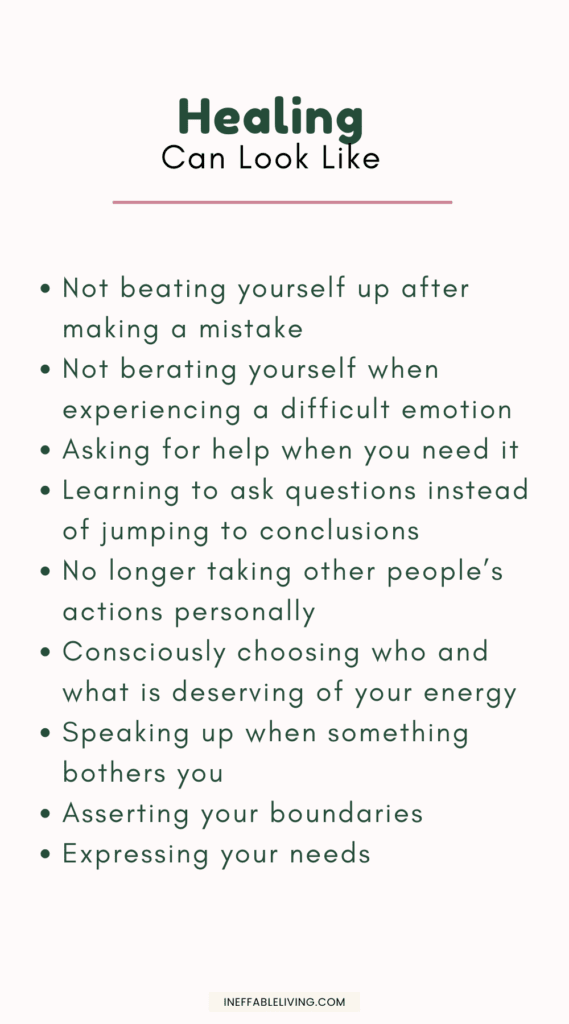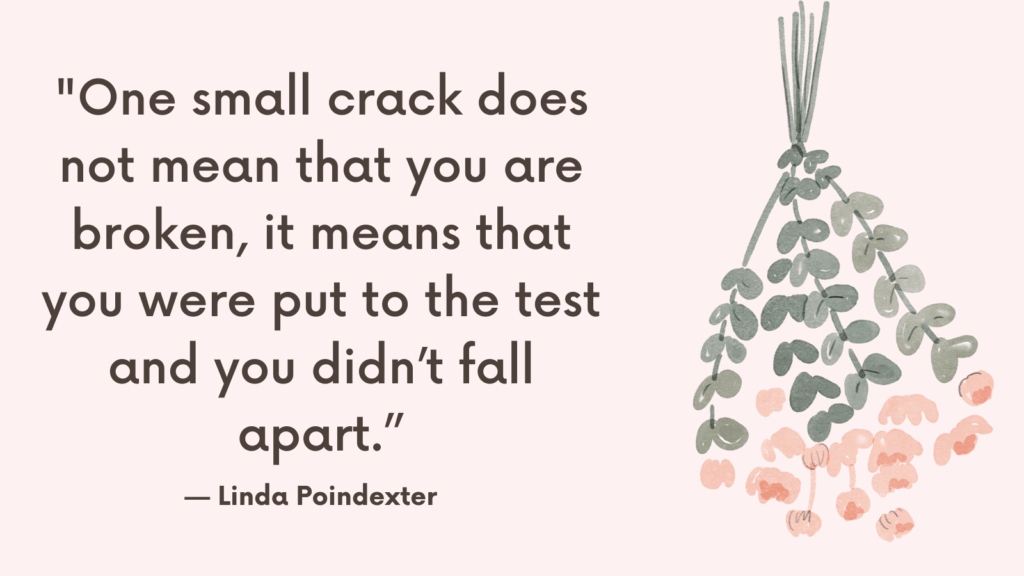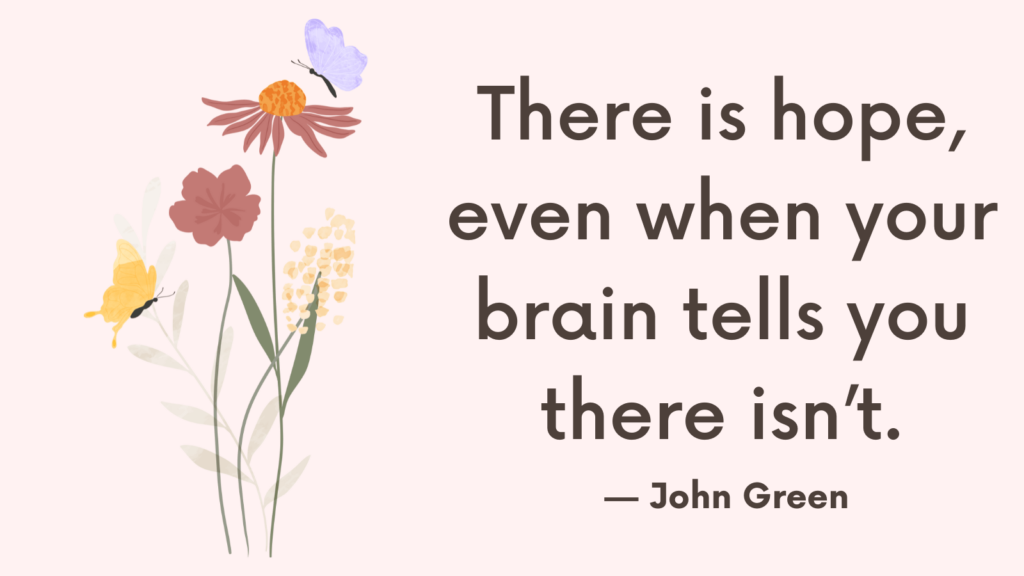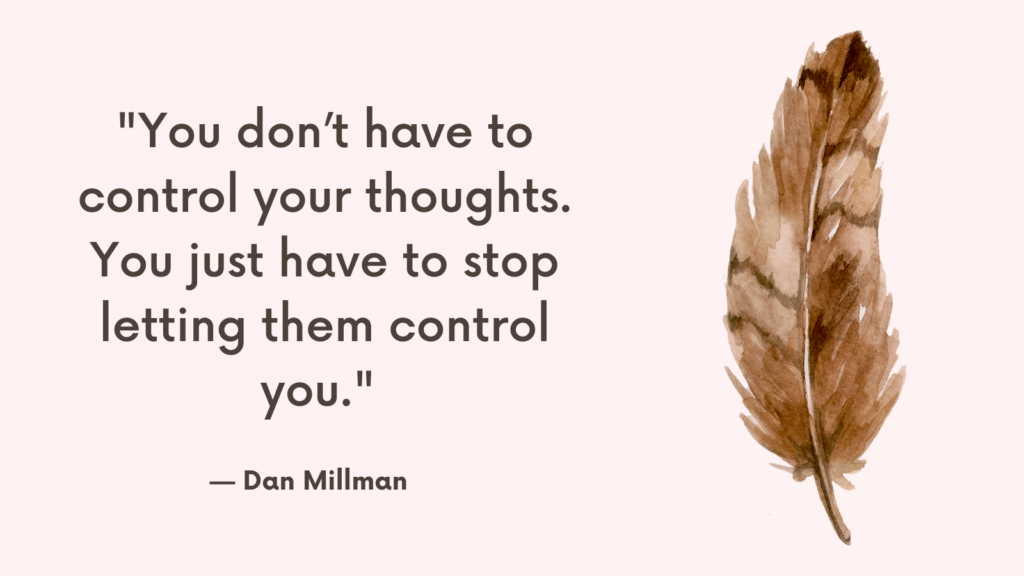Today, you’re going to discover how healing isn’t linear.
Healing Isn’t Linear: What Does It Mean?
There isn’t a step by step guide that will take you from “wounded” to “healed.”
This is mainly because the journey to healing is unique and different for each one of us. What helps someone else might not help you and vice versa.
But also healing can be an ongoing process throughout our entire life.
We never stop learning and growing and with growth, there will be more old coping mechanisms to let go of and change and more beliefs to challenge.
Healing isn’t linear also means you might “fall back” a step.That is, you might turn back to unhealthy coping skills during times of stress.
Learning healthier ways of coping will take some time before it becomes integrated into our lives. It’s not once and done, it’s an ongoing practice.
But falling back a step doesn’t mean the progress you made so far is wasted. All those instances of choosing healthy coping behaviors aren’t erased by one instance of turning to old, familiar patterns.
You still are able to pick up where you left.
to sum up, healing isn’t a goal to achieve, but a continuous practice.
Related: Best 15 Inner Child Exercises: How To Connect With Your Inner Child (& Heal Your Childhood Wounds)
Why Is It Important to Remind Yourself That Healing Isn’t Linear?
While the statement “healing isn’t linear” might sound logical in theory, it can be challenging to embrace it as you’re healing.
Sometimes it will feel as if you’re back at square one of your journey, even when you’ve been actively healing yourself for a long time.
To remind yourself that healing isn’t linear is a practice in extending compassion toward yourself.
Related: Why Is Trauma Therapy So Hard? (+Best Trauma Healing Exercises To Support Your Recovery)

How to Pick Yourself Up & Not To Give up?
Although failure should be a motivation to learn from our mistakes and to do better next time, many people simply give up after their first attempt.
People who give up after their first failure usually share some of these signs:
- They worry about being perceived as failures by others.
- They only want to attempt things they’re likely to succeed in.
- They’re not likely to try something they failed at the first time.
- They believe that successful people were born with a natural talent to succeed.
- Much of their self-worth stems from their ability to succeed.
- The possibility of failure brings them much discomfort.
- …
Failure shouldn’t be a reason to give up.
In fact, successful people consider failure as a stepping stone to success.
Why We Give Up?
1. Fear
Most people’s unwillingness to try something again after their first failure stems from their fear.
However, people don’t share the same fear of trying again. Some people fear disappointing others around them. Others might worry that they won’t be able to handle a second setback.
So rather than facing their fears, many people choose not to try again.
Some might even try to hide their failure by making excuses such as “I didn’t have the time to work on it at all” even when they’ve devoted so much of their energy and time preparing for that project.
Related: How To Live A Peaceful Life? 101 Timeless Principles to Find Peace Within Yourself
2. Allowing failure to define our self-worth
When people attach their self-worth to success, it’s hard for them to feel good about themselves when they fail.
It’s even harder for them to risk another failure by trying again.
To them, failure means they’re not capable enough or smart enough.
Related: Top 18 Self Esteem Exercises (+FREE CBT For Self-Esteem Worksheets PDF)
3. Our mind-set
Many people have a fixed mindset about their abilities.
They don’t believe that they have control over what they’re able to do.
They think that if you weren’t born with a God-given talent to do something, then you won’t be able to do it.
So they give up trying after their first failure. In their minds, they’re simply weren’t meant to do it.
Related: How Confident Am I Quiz (+Best 13 Practical Tools To Feel More Confident)
The problem with giving up
Giving up after your first failed attempt can easily reinforce the idea that failure is bad and that you weren’t meant to succeed.
In general, this will prevent you from trying new things in life and reaching your goals.
How Not to Give Up?
#1. Identify Your Self-Limiting Beliefs
It’s easy to develop inaccurate or self-limiting beliefs about failure after failing your first attempt.
These beliefs can influence the way you think, feel, and behave towards future attempts at anything.
Here are some scientific facts about perseverance and failure to help change your limiting beliefs:
– Deliberate practice can be more important than natural talent. Research studies have found that people who practice daily for ten years can surpass others with natural talent in fields like music and sports.
– Perseverance has been shown to be a much better predictor of success than IQ. And while not everyone with a high IQ reaches a high level of achievement, perseverance is an essential component of success.
Don’t let your self-limiting beliefs hold you back from reaching success.
Spend some time examining your beliefs about why you don’t think you can succeed, and replace them with more realistic ones, such as the following:
- Failure is part of the journey to success.
- I can handle any setback on my journey to success.
- Failure is a sign that I’m trying and that I’m constantly challenging myself.
Related: What Causes Cognitive Distortions? (+Top 10 Common Cognitive Distortions & How To Challenge Them)
#2. Change The Way You View Failure
See your setbacks as an opportunity to learn and do better next time.
When you focus on what you can learn, you’ll find it easier to accept failure as part of the process.
Keep in mind that everyone has shortcomings, including you, and that your worth as a person doesn’t decrease with failure.
Related: High Functioning Anxiety Test (& How To Support Anxiety Recovery)
#3. Face Your Fear of Failure
Emotions can influence your thoughts and behavior. Your fear of failure can hold you from trying again after your first attempt.
Don’t let emotions prevail over your logic. Instead, face your fears and do it anyway.
The more you do it, the less scary it becomes. You’ll see yourself that whatever might happen, you can handle it and that the lessons to be learned are worth it.
Related: Best 9 Tips On How To Stop Avoidance Coping (+FREE Worksheets PDF)
#4. Move Forward After Failure
If your first attempt has failed, spend some time examining what happened, and figure out what could be done differently next time.
If you fail at something that isn’t important to you, and that won’t get you closer to your goals, you might decide that it’s not worth the effort and time.
However, if you need to overcome that obstacle in order to achieve your dreams, it makes sense to try again.
This time, conceive a better plan that will increase your chances of success. Learn from your mistakes so you won’t repeat them again.
Related: How To Make Peace With Your Past Mistakes Today and Never Repeat Them?
#5. Let Go of Perfectionism
Perfectionism generates a lot of anxiety because achieving and maintaining internal and/or external unwavering standards means we’re under threat of failure.
Our ideas of perfection can become a barrier to real love for ourselves since self-love becomes too conditional, too dependent on performance.
Many people believe that self-criticism helps them become “better,” or more lovable. But self-criticism is almost always an unproductive use of our energy and attention.
Rather than trying so hard to control everything, self-love encourages you to focus on building your inner resource of resilience.
This way, you learn to handle disappointments with acceptance and learn from them, rather than remaining stuck in fear of failure.
Excellence vs. perfectionism
The pursuit of excellence is quite different from perfectionism.
Whatever goal you set for yourself (e.g. getting higher grades, getting more organized, maintaining a healthy weight, etc.) when you’re striving for excellence:
- You are enjoying making progress, even when it’s incremental.
- You do it even when you know no one else would notice
- You acknowledge that you can’t control everything
However, when you cling to unrealistic standards, you undermine your abilities and obsess unnecessarily over disapproval and rejection.
How to let go of perfectionism?
First, ask yourself, “Whose standards am I trying to meet.”
Often it’s our culture, peers, caregivers, but rarely us.
Next, question these standards. Ask yourself do you agree with these expectations? Do they reflect your innermost values?
By letting go of meeting others’ standards and goals, you get the time and energy you need to focus on what you love.
Related: Top 20 Practical Ways to Overcome Toxic Perfectionism (& Get Things Done)
#6. Allow Self-Love to Come From Within
Most people believe that self-love depends on achievement and the love and approval of others.
In this sense, we’re only lovable when we get that job, or lose weight, or be in a relationship, or never lose our temper or show our pain.
With such standards, the idea of treating ourselves lovingly may seem like a dangerous experiment.
You may find yourself wondering, “If I practice self-accepting, wouldn’t that mean that I’m allowing myself to be lazy?”
Many people confuse self-love with self-indulgence.
While self-indulgence means buying an extravagance you can’t afford and having one cookie too many, self-love, on the other hand, means nurturing your needs and doing something for yourself that’s good for your growth.
Related: Self-Love Journey: How to Start Loving Yourself?
“Am I There Yet?”: 10 Signs You’re On The Right Path To Healing
How do you know when you are well enough to call yourself emotionally healthy?
For the most part, it is when you have achieved inner strength, security, and self-awareness.
However, the following are common signs to help you know how far you are in your growth journey:
1. You Allow Yourself to Feel What You Feel
When you are emotionally healthy, there is no sense of urgency to avoid your feelings.
You are comfortable with being anxious, afraid, sad, angry, or loving.
You allow these feelings to come and go, without judgment.
You also take responsibility for your own emotions, knowing that no one can make you feel anything without your consent and no one can change your difficult emotions or make them go away.
However, even though you’re comfortable feeling and expressing your emotions, that doesn’t mean you are not in control of them.
When you are angry, you may choose to take a few deep breaths to calm yourself down, or write down your feelings and thoughts in your journal, before approaching the other person and addressing the issue.
When you are sad, you allow yourself to cry and to take some time to be alone, but you also don’t get stuck in that feeling and use healthy ways to boost your moods.
In general, you don’t view your difficult emotions as something to get rid of. Rather, you see them as a personal compass: feedback about what is happening in your environment.
Related: Top 21 Emotional Writing Prompts To Process Emotions
2. You Are No Longer Driven by Compulsive Behavior
Even though you might occasionally use compulsiveness to cope, you are self-aware and you take responsibility for the consequences of these behaviors without blaming anyone else.
Whether you use food, shopping, work, or anything else to cope with difficult emotions, you are self-aware and you know that eventually, you’ll have to deal with these difficult emotions properly.
If things become unmanageable, you seek appropriate help.
Related: How To Stop Bad Habits And Addictions?
3. You Follow an Effective Plan In Place to Take Care of Your Physical Health
An emotionally healthy person knows well that physical health and emotional health are interdependent, and that pain, lack of exercise, low sleep quality, and unbalanced diet can negatively impact your emotional health.
An effective self-care plan doesn’t have to be perfect. The emotionally healthy person is self-aware about what he ingests, how well he’s sleeping, his need for exercise, and any potential medical problems.
Related: Top 45 Self Care Day Ideas at Home To Kickstart Your Self Care Ritual
4. You Stretch Yourself Beyond Who You Are Today
Personal growth is an ongoing process.
When you’re emotionally healthy, you accept yourself the way you are, but you also seek to learn more, out of joy rather than not feeling good enough.
This may mean learning more about your field, going back to school, finding a mentor, etc.
In other words, you are comfortable being the student and you try to learn something from everyone around you.
5. You Have Supportive Relationships In Your Life
Emotionally healthy people are assertive and take responsibility for getting their needs met through supportive relationships.
When you’re an emotionally healthy person, you choose to focus on the quality of small number of meaningful relationships, rather than trying to manage intimate relationships with a large number of people.
You are able to set limits and freely express your feelings.
Related: How to Get More Affection from Your Relationships?
6. You Form a Strong Identity
Strengthening identity is an ongoing process, but you will find comfort in knowing that you’re self-aware.
You have preferences and opinions and you can express them without fear. You find it easier to make I-statements when expressing yourself.
Your beliefs change only when you choose to let go of old, limiting beliefs and embrace positive ones.
You still have a need for approval, but self-approval is a priority.
In general, you feel connected with your inner self and in line with your own values.
Related: Raising low self-esteem: 18 Ways to Build High Self-Esteem
7. You Are Able to Balance Work and Personal Life
Although balance can be an elusive goal, as you become emotionally healthier, work becomes the means to a fulfilling life, rather than the life itself.
Your motivation for work becomes focused more on being able to use your natural gifts and finding fulfillment through work, but it doesn’t consume your life and it doesn’t prevent you from enjoying your personal life.
8. You Are Willing to Be Vulnerable
Emotionally healthy people are willing to be emotionally intimate and are never content to live in isolation or superficially with other people.
They are proactive in their relationships.
They worry less about choosing the right person and more about being the right person.
9. You Are Willing to Give to Other People
Emotionally healthy people have enough of what they need and are willing to be compassionate and generous towards other people.
Gratitude for the opportunities they have to give replaces resentment for not having their past needs met.
10. You Have Incorporated Spiritual Practices into Your Life
Being spiritual does not mean being a saint.
While religion can be a form of spirituality, there is a lot more to spirituality than religion.
Healthy spirituality is a conscious awareness of yourself and your environment.
When you are emotionally healthy, you are connected to your inner self and access inner guidance easily.
During tough times, you look inward or upward, whichever seems right, knowing that everything is going to be okay no matter what the outcome.
Although you have your ups and downs, you still feel centered and at peace.
Related: Top 39 Self Love Mantras To Practice Daily (+9 Ways To Grow In Self-Love)

References
- How Do I Know If My Mental Health Is Improving? (verywellmind.com)
- 8 Signs You’ve Made Positive Mental Health Change | The Light Program (pyramidhealthcarepa.com)
- 8 tell-tale signs that your mental health is in good shape : Psychologist | HealthShots
- How Do You Know When Your Depression Is Improving? | Psychology Today



